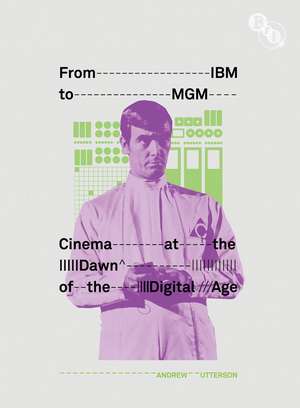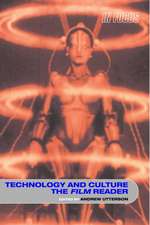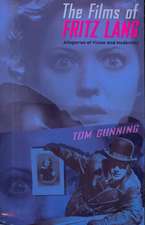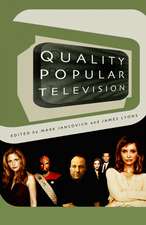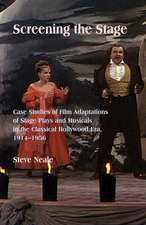From IBM to MGM: Cinema at the Dawn of the Digital Age
Autor Andrew Uttersonen Limba Engleză Hardback – 11 ian 2011
| Toate formatele și edițiile | Preț | Express |
|---|---|---|
| Paperback (1) | 231.42 lei 3-5 săpt. | |
| British Film Institute – 12 ian 2011 | 231.42 lei 3-5 săpt. | |
| Hardback (1) | 598.35 lei 6-8 săpt. | |
| Bloomsbury Publishing – 11 ian 2011 | 598.35 lei 6-8 săpt. |
Preț: 598.35 lei
Preț vechi: 858.43 lei
-30% Nou
Puncte Express: 898
Preț estimativ în valută:
114.50€ • 119.79$ • 95.11£
114.50€ • 119.79$ • 95.11£
Carte tipărită la comandă
Livrare economică 02-16 aprilie
Preluare comenzi: 021 569.72.76
Specificații
ISBN-13: 9781844573240
ISBN-10: 1844573249
Pagini: 184
Ilustrații: 52 b/w photos
Dimensiuni: 172 x 234 x 18 mm
Greutate: 0.52 kg
Ediția:2011
Editura: Bloomsbury Publishing
Colecția British Film Institute
Locul publicării:London, United Kingdom
ISBN-10: 1844573249
Pagini: 184
Ilustrații: 52 b/w photos
Dimensiuni: 172 x 234 x 18 mm
Greutate: 0.52 kg
Ediția:2011
Editura: Bloomsbury Publishing
Colecția British Film Institute
Locul publicării:London, United Kingdom
Caracteristici
Case studies include Godard's Alphaville (196, Kubrick's 2001: A Space Odyssey (1968) and Crichton's Westworld (197
Notă biografică
ANDREW UTTERSON Senior Lecturer in Film and Digital Media at Canterbury Christ Church University, UK. He is the editor of Technology and Culture: The Film Reader (2005) and co-editor of Film Theory: Critical Concepts in Media and Cultural Studies (2004).
Cuprins
Introduction.- Computers in the Workplace: IBM and the 'Electronic Brain' of Desk Set (1957).- From the Scrap-Heap to the Science Lab: The Pioneers of Computer Animation.- Tarzan vs. IBM: Humans and Computers in Alphaville (1965).- Digital Harmony: The Art and Technology Movement.- 'I'm Sorry Dave, I'm Afraid I Can't Do That': Artificial Intelligence in 2001: A Space Odyssey (1968).- Expanded Consciousness, Expanded Cinema: A Techno-Utopian Counterculture.- To See Ourselves as Androids See Us: The Pixel Perspectives of Westworld (1973).- Conclusion.- Filmography.- Bibliography.- Index.
Recenzii
...a stimulating and very engaging read
Utterson adroitly draws out the tensions between "technophobic" film portrayals of computers and an avant-garde of digital utopians engaged in computer-aided art (spare a thought for the sad fate of the "lightpen"), who tempted directors to adopt their technology, as with Westworld's pixellated point-of-view shots. Quirky techno-anecdotes abound: the hacking of scavenged second-world-war ballistics computers; the origin of ASCII art; talk of a computer that makes a "Freudian slip"; and even an evocative appeal to "robotic ontology". Is it time to watch The Matrix again yet?'
Utterson adroitly draws out the tensions between "technophobic" film portrayals of computers and an avant-garde of digital utopians engaged in computer-aided art (spare a thought for the sad fate of the "lightpen"), who tempted directors to adopt their technology, as with Westworld's pixellated point-of-view shots. Quirky techno-anecdotes abound: the hacking of scavenged second-world-war ballistics computers; the origin of ASCII art; talk of a computer that makes a "Freudian slip"; and even an evocative appeal to "robotic ontology". Is it time to watch The Matrix again yet?'
Descriere
Descriere de la o altă ediție sau format:
Andrew Utterson's unique study charts the beginnings of digital cinema, addressing both how filmmakers used new digital technologies and how attitudes and anxieties about the rise of the computer were represented in films such as Lang'sDesk Set, Godard'sAlphaville, Kubrick's2001: A Space Odysseyand Crichton'sWestworld.
Andrew Utterson's unique study charts the beginnings of digital cinema, addressing both how filmmakers used new digital technologies and how attitudes and anxieties about the rise of the computer were represented in films such as Lang'sDesk Set, Godard'sAlphaville, Kubrick's2001: A Space Odysseyand Crichton'sWestworld.
Textul de pe ultima copertă
At
once
both
timely
and
historically
grounded,From
IBM
to
MGM:
Cinema
at
the
Dawn
of
the
Digital
Ageexplores
the
history
of
cinema's
earliest
encounters
with
computers,
as
film-makers
responded
to
the
flurry
of
digital
devices
that
emerged
in
the
post-war
decades.
Capturing
the
fervour
and
fears,
hysteria
and
hyperbole,
technophilia
and
technophobia
of
a
crucial
period
of
digital
revolution,
film-makers
in
a
range
of
contexts
sought
to
respond
to
the
computer
as
a
new
technology,
one
with
profound
significance
for
cinema
and
the
wider
world.
Whether in films in which computers 'starred' on screen (from Jean-Luc Godard'sAlphavilleand Stanley Kubrick's2001: A Space Odysseyto Walter Lang'sDesk Setand Michael Crichton'sWestworld) or in those produced using this same technology (the films of John Whitney, Stan VanDerBeek and other pioneers), what the cinema of this era shared was a willingness to engage with the computer head-on, exploring and exploiting the essential qualities of new tools as connections were forged between the worlds of cinema and computing.
Whether in films in which computers 'starred' on screen (from Jean-Luc Godard'sAlphavilleand Stanley Kubrick's2001: A Space Odysseyto Walter Lang'sDesk Setand Michael Crichton'sWestworld) or in those produced using this same technology (the films of John Whitney, Stan VanDerBeek and other pioneers), what the cinema of this era shared was a willingness to engage with the computer head-on, exploring and exploiting the essential qualities of new tools as connections were forged between the worlds of cinema and computing.
